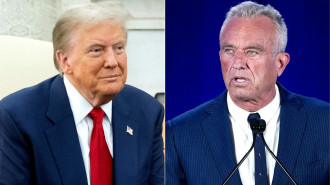Netanyahu mobilises army, police reserves amid calls for de-escalation
Israeli Prime Minister Benjamin Netanyahu mobilised police and army reserves late Friday after separate attacks killed three people in the West Bank and Tel Aviv in the latest escalation of deadly violence.
Despite appeals for restraint, tensions have surged since Israeli police attacked Palestinians on Wednesday inside Jerusalem's Al-Aqsa mosque, with Israel bombarding both Gaza and Lebanon following rocket fire by Palestinian militants.
Israel's army said it had launched a manhunt for the perpetrators of Friday's shooting in the occupied West Bank which killed three people.
In central Tel Aviv, one man was killed and five people were wounded late Friday in a car-ramming attack, Israeli rescue services said.
"All the victims were tourists," the Magen David Adom emergency service said, without providing details on their nationalities.
Three people, including a 17-year-old, were moderately wounded, while two had light injuries, the rescue service added.
Shortly afterwards, Israeli Prime Minister Benjamin Netanyahu "instructed the Israel Police to mobilise all reserve border police units and has directed the IDF to mobilise additional forces", his office said.
Oded Revivi, mayor of the illegal settlement of Efrat, confirmed the dead in the West Bank shooting were Israeli sisters aged 16 and 20, and the wounded woman was their mother.
A British diplomat later confirmed that the two also held UK passports, while calling for "all parties... to de-escalate tensions".
Cross-border strikes
Friday's attacks came after Israel launched air strikes and an artillery bombardment before dawn in response to rocket fire from the Gaza Strip and Lebanon.
AFP journalists heard explosions in Lebanon's Tyre region as well as in Gaza, where Israeli air raids began before midnight.
The Lebanese army said it had found and dismantled a multiple rocket launcher in an olive grove in the Marjayoun area near the border, still loaded with six primed rockets.
The Israeli army said it had hit two tunnels and "two weapon manufacturing sites" belonging to Hamas in Gaza "as a response to the security violations of Hamas".
It said air defences intercepted 25 rockets on Thursday, while five hit Israeli territory.
Israel "will not allow Hamas to operate from within Lebanon", it added.
On Friday, Hezbollah deputy chief Naim Qassem said "the threats and intimidation of the Zionist leaders will lead nowhere".
Army spokesman Lieutenant Colonel Richard Hecht had blamed Palestinian militants for the rocket fire from Lebanon.
The United Nations Interim Force in Lebanon (UNIFIL), which patrols the area along the border, urged restraint, adding: "Both sides have said they do not want a war."
On Friday evening, the army said it had shot down a drone that entered Israel's airspace from Lebanon, without elaborating.
The Palestinian health ministry had earlier reported "partial damage" to the Al-Dorra children's hospital in Gaza City. Hecht said Israel was investigating.
Hamas condemned the "appalling Israeli aggression" and said it holds Israel "fully responsible for the consequences".
Mosque raid
A Qatari official on Friday said Doha was mediating between Israel and the Palestinians.
Doha -- which has previously mediated between Israel and Hamas -- "is working to deescalate the situation on all sides, with the latest contact being noon today," the official said, speaking on condition of anonymity.
Israeli riot police had stormed the prayer hall of Al-Aqsa mosque in a pre-dawn Wednesday raid attacking worshipers inside the holy site.
The violence sparked an exchange of rockets and air strikes with militants in Gaza.
UN chief Antonio Guterres meanwhile has urged "all actors to exercise maximum restraint".
The United States said it recognised "Israel's legitimate right to defend itself", while France vowed "unwavering" support for "Israel's security and Lebanon's stability and sovereignty".
An Iran foreign ministry spokesperson "strongly condemned the attacks of the aggressor Zionist regime", and Russia called for "an end to the violence" and a "lasting ceasefire".
Hamas and Islamic Jihad told Egypt, a longstanding mediator between Israel and the Palestinians, that rocket fire would continue "if Israel continues its aggressions and air strikes but, if these aggressions stop, they will cease fire," Palestinian sources said.







 Follow the Middle East's top stories in English at The New Arab on Google News
Follow the Middle East's top stories in English at The New Arab on Google News
![Ben & Jerry's has taken Unilever to court for its alleged attempts to silence it [Getty]](/sites/default/files/styles/image_330x185/public/2024-11/GettyImages-2183900214.jpg?h=199d8c1f&itok=jEcYtQ64)

![The meeting between Musk and Iravani was 'positive', Iranian sources said [Getty]](/sites/default/files/styles/image_330x185/public/2024-11/GettyImages-2184077711.jpg?h=f5c1ac2a&itok=Wb2mIhsF)